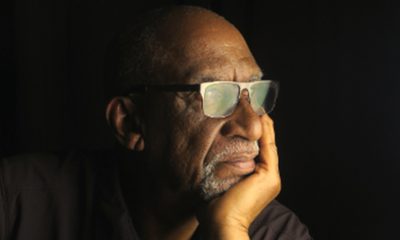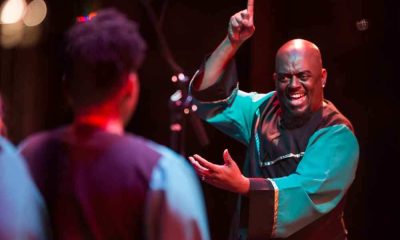Arts and Culture
Negro Spirituals and Gospel Music Influence International Relations
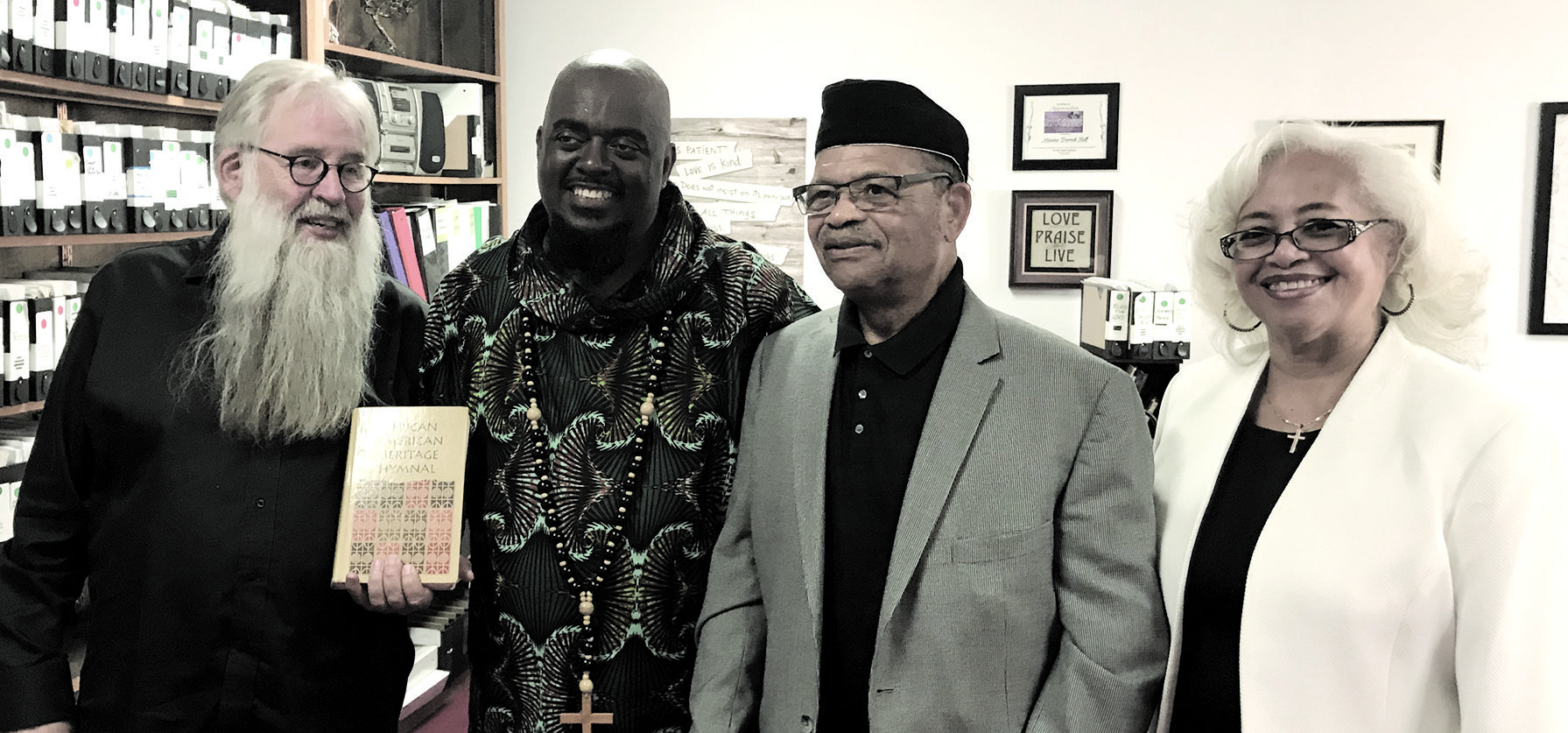
International music leaders celebrated the “Roots from the West” program on July 1, at Allen Temple and gave the African American Heritage Hymnal to Per Oddvar “Prots” Hildre, founder and director of SKRUK choir visiting from Norway. Standing with him are L. to R., Terrance Kelly, artistic director of the Oakland Interfaith Gospel Choir, and Pastor Emeritus and Mrs. J. Alfred Smith, Sr. Photo by Sue Taylor.
Three choirs sang July 1 at a program at Allen Temple Baptist Church in East Oakland— the Oakland Interfaith Gospel Choir (OIGC), visiting Norwegian Choir SKRUK, and the Allen Temple Unity Choir, which opened the program.
OIGC Artistic Director Terrance Kelly, “grew up” at Allen Temple, and joyfully relished returning “home” as almost 200 voices filled the sanctuary.
One of many programs over the last two weeks, the cultural exchange came from OIGC’s visit to Norway, where musicians and directors of the two choirs fell in love with each other. Both the SKRUK choir under the direction of Per Oddvar “Prots” Hildre, and OIGC performed all over the Bay Area. Concluding performances were at First Presbyterian Church of Oakland Monday night, and Napa Methodist Church on Tuesday, July 3.
SKRUK from Norway was founded in 1973, OIGC in 1986, and Allen Temple has had choirs since the church was founded almost 100 years ago. Liberation—a prevailing theme of Negro spirituals and Gospel music—has been a focus of all three choirs.
Gospel music is performed and appreciated across Scandinavia and Europe. A group of 30 students from International House at the UC Berkeley campus visited Allen Temple years ago to worship with the congregation and hear the music.
Attending the Sunday program was Pastor Emeritus J. Alfred Smith, Sr., who closed the program in prayer.
Afterward, SKRUK Director Prots Hildre was given the African American Heritage Hymnal and he immediately asked that Pastor “sign my copy.” He was thrilled to have the hymnal, available at the Allen Temple Bookstore and online where books are sold. The hymnal was published in 2001 and is still the only hymnal of its kind.
Pastor Smith and the late Minister of Music Betty D. Gadling served on a committee that published the hymnal, “committed to preserving and promoting the best congregational music of our ecumenical African-American Christian tradition.”
In the introduction, Pastor Smith wrote, “This tradition is rooted in the richness of our historical past, but it is also dynamic and evolutionary with the continuing creativity of God-inspired persons.”
From reports of those attending the various programs around the Bay Area of OIGC and SKRUK, the music was performed by “God-inspired” persons. The Allen Temple sanctuary resounded with ethereal sounds, with music from Norway, the early Christian church, and the most pre-eminent of traditional and modern Gospel music.
Pastor Smith quotes in his introduction essay from the book, “The Black Church in the African American Experience,” by C. Eric Lincoln and Lawrence H. Mamiya, that “Black people ‘Africanized’ Christianity in America as they sought to find meaning in the turn of events that made them involuntary residents in a strange and hostile land.”
Even now in 2018, many around the globe seeking liberation have their own need to “find meaning,” and the music performed these past two weeks surely lends itself to that mission.
For more information, visit www.oigc.org.
Arts and Culture
Faces Around the Bay Dr. Carl Blake, Pianist
Born in Liberty, Missouri, Carl Blake, a virtuoso and respected pianist, made his most recent migration to the East Bay in 1999. One might have seen him performing recently at Noontime Concerts in San Francisco, or at the Piedmont Center for the Arts in Oakland. He is Director of Music at The Church for the Fellowship of All Peoples in San Francisco. He was also co-organizer and collaborative pianist at Herbst Theater for The Majesty of the Spirituals concert in 2022 and has held several church positions in the Bay Area.
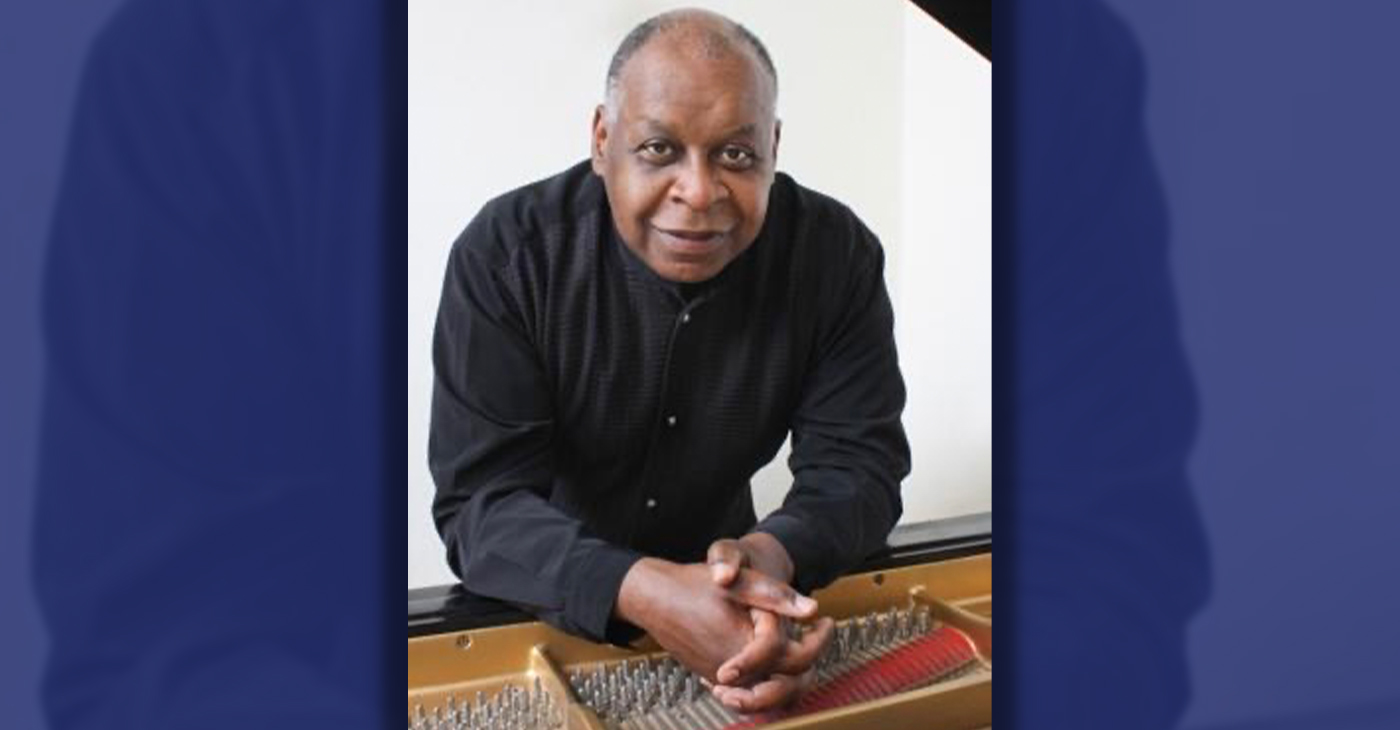
By Barbara Fluhrer
Born in Liberty, Missouri, Carl Blake, a virtuoso and respected pianist, made his most recent migration to the East Bay in 1999.
One might have seen him performing recently at Noontime Concerts in San Francisco, or at the Piedmont Center for the Arts in Oakland. He is Director of Music at The Church for the Fellowship of All Peoples in San Francisco. He was also co-organizer and collaborative pianist at Herbst Theater for The Majesty of the Spirituals concert in 2022 and has held several church positions in the Bay Area.
Blake obtained a Bachelor of Music from Boston University and continued post-baccalaureate studies in Jamaica before earning a Master of Arts in Music at San Jose State University. He was the recipient of two Fulbright residencies in Honduras and completed a third residency at the University of St. Petersburg in Russia. He has a Doctor of Musical Arts from Cornell University.
At age 19, Blake, then an undergraduate piano major at Boston University, was “discovered” by Impresario Dr. W. Hazaiah Williams, who is the Founder and Director of Today’s Artists/Four Seasons Arts.
Williams honored Blake by awarding him the first Marian Anderson Young Artist Award. Anderson personally presented the award at the Masonic Auditorium in S.F. Subsequently, Blake was presented by Dr. Williams in his San Francisco debut at The Herbst Theatre. Williams subsidized a year of study abroad for Blake at the Paris Conservatory of Music. Additionally, Williams sponsored Blake’s New York Weill Hall debut, where he has performed twice since. Blake performed several times at the Yachats Music Festival in Oregon.
Blake continues to perform nationally and abroad. His hobbies are reading, baking and travel. He says, “I’m still pumping ivories, as Belgian pianist Jeanne Stark described the disciplined practice of concert piano.”
Arts and Culture
Oakland Jazz Great Offers Master Class as City Declares “John Handy Day”
World-renowned jazz master saxophonist John Handy, a McClymond’s High School graduate, was presented with a Mayor of Oakland Proclamation declaring Feb. 12, as John Handy Day in the city. Handy is most notably known as the featured saxophonist for Charles Mingus on “Goodbye Pork Pie Hat” from the album “Mingus Ah Um” (1959) and on “Hard Work” from his own album “Hard Work” (1976).
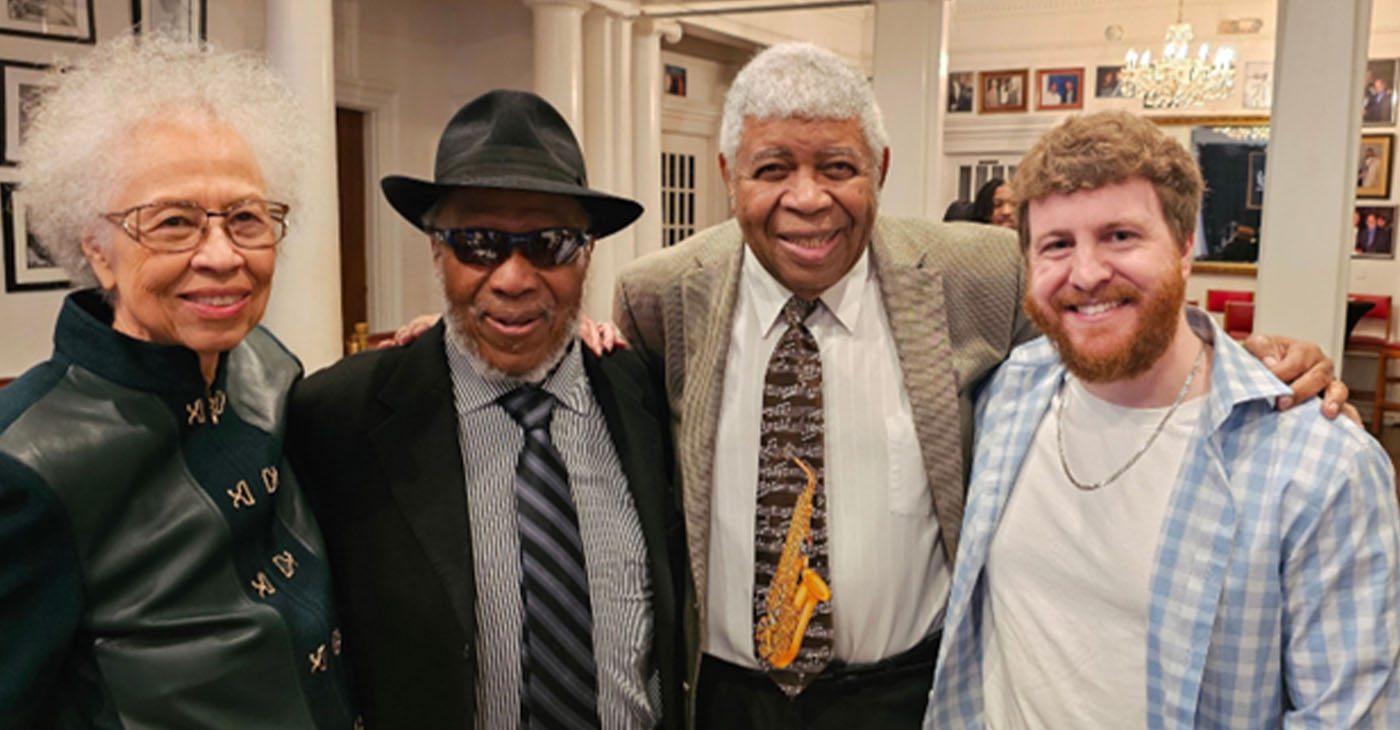
By Conway Jones
World-renowned jazz master saxophonist John Handy, a McClymond’s High School graduate, was presented with a Mayor of Oakland Proclamation declaring Feb. 12, as John Handy Day in the city.
Handy is most notably known as the featured saxophonist for Charles Mingus on “Goodbye Pork Pie Hat” from the album “Mingus Ah Um” (1959) and on “Hard Work” from his own album “Hard Work” (1976).
“John Handy is a jazz icon and an inspiration to musicians everywhere,” said Ayo Brame, a 16-year-old Oakland tenor saxophone player who is enrolled at the Oakland School for the Arts.
In celebration of this day, the reception in downtown Oakland at Geoffrey’s Inner Circle was a gathering of artists, young and old, coming together in his honor and celebrating his 91st birthday.
Handy presented a Saxophone Colossus free masterclass for musicians. This class afforded a rare opportunity to learn about the saxophone from an aficionado. The class was free and open to all – saxophonists, vocalists, aficionados, students, and casual listeners.
“As a longtime friend for over 60 years, and fellow musician who has had numerous opportunities to share the stage with John, it has always been a pleasure performing with him and hearing his creative interpretations of the music and his gift of ease inspiring the next generation of jazz musicians,” said Roger Glenn, a multi-instrumentalist.
Arts and Culture
Musical Chronicling Life of Betty Reid Soskin Set for Bay Area Debut
Betty Reid Soskin’s storied 102 years includes time spent as a WWII defense worker, activist, business owner, songwriter, National Park Service park ranger and so much more. Now the Richmond icon is the subject of a musical based on her incredible life.
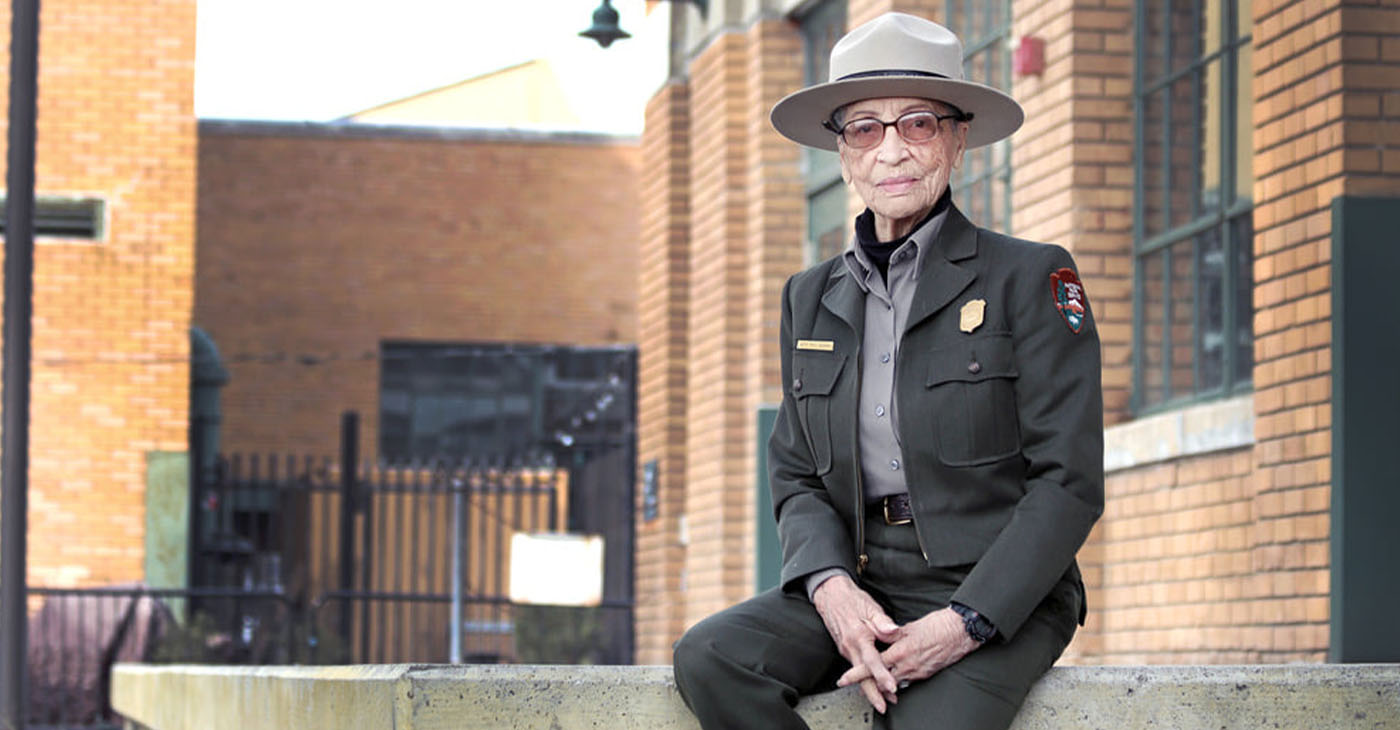
The Richmond Standard
Betty Reid Soskin’s storied 102 years includes time spent as a WWII defense worker, activist, business owner, songwriter, National Park Service park ranger and so much more. Now the Richmond icon is the subject of a musical based on her incredible life.
“Sign My Name to Freedom,” a San Francisco Bay Area Theatre Company (SFBATCO) production which will focus on the life, music and writing of Ms. Soskin, will premiere at San Francisco’s Z Space Friday, March 29 and continue through Saturday, April 13. Tickets range from $15–$65 and can be purchased online at https://www.sfbatco.org/smntf
The musical is directed by Elizabeth Carter, while playwright Michael Gene Sullivan integrates Ms. Soskin’s own music throughout dialogue between what SFBATCO calls “The Four Bettys” as they progress through a century of experiences of this awe-inspiring American woman.
The cast of “Sign My Name to Freedom” features Tierra Allen as Little Betty, Aidaa Peerzada as Married Betty, Lucca Troutman as Revolutionary Betty and Cathleen Riddley as Present Betty Reid Soskin, according to Artistic Director Rodney Earl Jackson Jr. and Managing Director Adam Maggio. Other casting will be announced in the future.
Jackson said that having Soskin’s blessing to steward her life’s story is an honor and career highlight for him and that her journey stands as “a beacon for Black Americans, women and people of color all across the world [and] is a testament to the strength of the human spirit.”
San Francisco’s Z Space is located at 450 Florida St. in San Francisco. Check out the trailer here at https://www.youtube.com/watch?v=B-ap9N2XBB0
-

 Activism4 weeks ago
Activism4 weeks agoOakland Post: Week of March 20 – 26, 2024
-

 #NNPA BlackPress3 weeks ago
#NNPA BlackPress3 weeks agoCOMMENTARY: D.C. Crime Bill Fails to Address Root Causes of Violence and Incarceration
-

 #NNPA BlackPress3 weeks ago
#NNPA BlackPress3 weeks agoMayor, City Council President React to May 31 Closing of Birmingham-Southern College
-

 #NNPA BlackPress3 weeks ago
#NNPA BlackPress3 weeks agoCOMMENTARY: Lady Day and The Lights!
-

 #NNPA BlackPress3 weeks ago
#NNPA BlackPress3 weeks agoFrom Raids to Revelations: The Dark Turn in Sean ‘Diddy’ Combs’ Saga
-

 #NNPA BlackPress3 weeks ago
#NNPA BlackPress3 weeks agoBaltimore Key Bridge Catastrophe: A City’s Heartbreak and a Nation’s Alarm
-

 #NNPA BlackPress3 weeks ago
#NNPA BlackPress3 weeks agoBaltimore’s Key Bridge Struck by Ship, Collapses into Water
-

 Activism3 weeks ago
Activism3 weeks agoOakland Post: Week of March 27 – April 2, 2024

